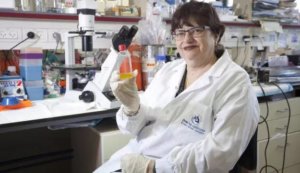
Meet 3 Trailblazing Women – Shulamit Michaeli-Goldberg
Prof. Shulamit Michaeli-Goldberg makes key discoveries in the fight against deadly diseases

When Prof. Shulamit Michaeli-Goldberg was a little girl, she wanted to be Marie Curie, the famed physicist who became the first woman to win the Nobel Prize. Her “dream job” was to have a lab where she would doggedly investigate complex theories in the hopes of making transformative scientific discoveries.
There is no question that Michaeli-Goldberg has lived out her dreams. When it comes to fighting some of the world’s most deadly and infectious diseases, she is squarely at the forefront of scientific research.
Michaeli-Goldberg is the Vice President for Research at Bar Ilan University, as well as a leading force behind Bar Ilan’s new Dangoor Center for Personalized Medicine. Located near Tel Aviv, Bar Ilan is already one of Israel’s hubs for studies in sciences and humanities. The Center, which opened in 2017, vastly expands Bar Ilan’s mission. It brings together interdisciplinary scientists in the fields of medicine, engineering, exact sciences, psychology and sociology. The goal is to bring research together with each patient’s unique circumstances, including their genetic background, physical attributes, symptoms and conditions.
A microbiologist by training, Michaeli-Goldberg has received five BSF grants, and she credits BSF for helping her to form productive and meaningful partnerships with U.S. scientists.
“The grants might be small financially, but they are very effective because they stimulate collaboration,” she said.
Michaeli-Goldberg’s most recent BSF grant is for a project focusing on RNA modification in trypanosomes. Her collaborators are Prof. Ron Unger, also of Bar Ilan University, and Prof. Christian Tschudi of Yale University.
Trypanosomes are a vicious order of parasites which infect millions worldwide, causing African sleeping sickness, South American Chagas disease, and leishmaniasis, or sand-fly fever, which affects a band of countries from Portugal through India, including Israel.
Trypanosome parasites are transmitted to mammals by the blood-sucking tsetse fly. They live in the insect’s gut for two to three weeks and then migrate to the saliva glands. When the fly has its next meal, the parasites are transferred via the saliva to the prey, infecting its bloodstream. In this way the mammal now becomes host to the parasite, and diseases are spread.
As part of the BSF-funded project, the team of American and Israeli researchers studied methodologies to deliver small molecules into these parasites. They discovered that, under stress, the parasites secrete exosomes which communicate a message to neighboring cells that something is wrong. Results strongly suggest that exosomes act as repellents that drive the fit parasites away from either damaged cells or an unfavorable environment. These findings could play a role in the development of powerful drugs to fight diseases caused by these parasites.
Michaeli-Golberg’s team has already published papers on the project in several scientific publications, including the Journal of Biological Chemistry, better known in the science world as the JBC. Editors of that publication were so impressed that they selected it for their 2019 retrospective, The Year in JBC: 2019.
“Out of all the scientific papers focusing on RNA, ours was the one selected by the JBC as the representative RNA article for 2019,” Michaeli-Goldberg said.
Beyond her extensive research, Michaeli-Goldberg teamed up with Prof. Jean Paul Lellouche of Bar-Ilan’s Department of Chemistry to develop nanoparticles that could prove successful in combating parasitic diseases. Iron oxide nanoparticles coated with a polymer were able to kill both leishmania parasites and trypanosomatid parasites in an animal model. In the future, the nano-drug will be tested on human patients.
For Michaeli-Goldberg, science is much more than a career. It is a life commitment.
“In order to succeed in science, you have to love it,” she said. “Even now, my children sometimes have a hard time understanding why I love science so much. But I just do.”
Michaeli-Goldberg has published more than a hundred articles in professional journals and books and patented a number of important technologies. She was the first researcher in Israel to be funded by the Howard Hughes Medical Institute for 10 years. She has won numerous prestigious awards, including the Israeli Society of Microbiology Award, both as a young researcher and as a senior research, and the Landau Prize, both in Medicine and more recently in Microbiology. When she was on the staff of the Weizmann Institute, she was awarded the Clore Prize for Outstanding Young Researcher and the prestigious Andre Lwoff Prize in Parasitology, given by the French Academy of Sciences.
Yet with all these accomplishments, Michaeli-Goldberg always looks toward the future. In 2018, she told the Times of Israel that she can envision a time when doctors can diagnose colon cancer, brain tumors and breast cancer via a simple blood test, even before the diseases become fully blown illnesses. And when they find cancer, they will target the genetic mutations that are at its core with a cocktail of medications that will not have any side effects.
“These new methods will revolutionize how we treat patients today,” said Michaeli-Goldberg. “We are closer to this than we think.”
